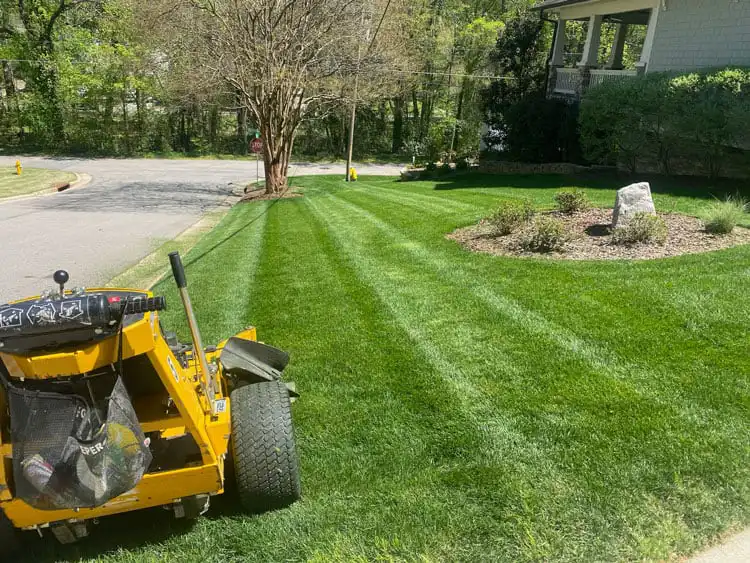Should I bag my grass clippings or leave them?
When you mow your lawn, these leftover plant parts fall to the ground. The longer they sit on your lawn, the more dried out they become. Some people bag them up in a garbage can or take them to a compost pile to use as fertilizer.
Turf Titanz, a company that provides top-tier landscaping services and sustainable lawn care, believes you can leave grass clippings on your lawn or bag them, depending on what you intend to achieve. What are the two sides to this story?
When to Leave Grass Clippings on The Lawn
In most cases, you should leave grass clippings right there on your lawn when you mow. The clippings provide a ‘green’ material that returns nitrogen to the soil as they decompose, and this is especially true for clippings from a mulching lawnmower.
While this is true, we want to give you a word of caution. Do not remove grass clippings from your lawn when the lawn is drought-stressed. This can lead to disease problems with your grass.
Why Leave Grass Clippings on the Lawn?
Here are some reasons to leave grass clippings on your lawn when you mow:
- Grass clippings are natural, organic materials that help the grass grow well. Leaving the clippings on the lawn adds valuable nutrients back to the soil.
- Composted grass clippings make great mulch in your garden beds and around ornamentals.
- Removing grass clippings from your lawn can result in a weaker lawn that is more susceptible to weed infestation.
- Do not remove grass clippings from your lawn if you are trying to grow a new lawn from seed.
- Do not remove grass clippings from a new sod lawn for at least four to six weeks after laying sod. The grass needs time to get established, and removing clippings reduces the amount of leaf surface available for photosynthesis.

When to Bag Grass Clippings
- If you are growing a fine-leaved type of grass such as Bermuda or Zoysia, it’s best not to leave clippings on the lawn after mowing. These lush grasses tend to mat down when wet and can lead to thatch problems. In this case, bag your grass clippings to avoid further complications.
- If you want to fertilize your grass clippings, bag them and take them to a composting facility. If placed in a backyard bin, grass clippings quickly begin decomposing anaerobically, which produces unpleasant odors and methane gas.
- If you have a small lawn or have established a new lawn from seed, you can bag your lawn clippings to avoid smothering the grass.
- If you are trying to remove thatch from your lawn, bag your clippings and leave them to sit on top of the soil for at least three weeks before removing them with a rake.
What Are The Benefits of Bagging Grass Clippings?
Bagging grass clippings come with their own set of benefits. First off, it will minimize grass pollen and allergens around your property. You will also be able to create your own fertilizer. You can rest assured knowing that grass clippings don’t contribute to landfill problems because they are biodegradable. Another benefit of bagging grass clippings is that it leaves a better-looking lawn, and helps to prevent thatch buildup.
How Often to Bag Grass Clippings
If you mow more than once a week in the height of summer, it’s a good idea to start collecting grass clippings that you sweep up from your driveway. When they dry in the bag, add them to a compost pile or you can use them as mulch around flowers and ornamentals.
In very hot weather, make sure you don’t leave grass clippings on the lawn for more than a day or two. When the weather is hot and dry, clippings quickly become hay and can damage your lawn as much as mowing over them.
What Are The Drawbacks of Bagging Grass Clippings?
Bagging grass clippings will reduce the amount of organic matter in your compost pile, which is an excellent source of nutrients for your lawn and garden. Also, if you bag grass clippings too often, you’ll spend a significant amount of time working your lawn. Turf Titanz offers professional residential landscaping services that will help you overcome this problem. Disposing of your bags of clippings may also be an issue in some areas.
When Not to Mow The Lawn
- Don’t mow your lawn when it’s wet or you’ll end up with a mess on your hands.
- Don’t mow your lawn while you’re battling a lawn disease. You may spread the problem unintentionally.
- Do not mow the lawn when the grass is drought-stressed. Let your lawn recover from a water shortage before mowing it again.
- It’s better not to mow your lawn in the hottest part of the day when the sun is high.
Contact Us If You’re Wondering if You Should Bag Your Grass Clippings or Leave Them
You want to do what is best for your lawn and garden, so contact us here at Turf Titanz if you have questions about whether you should bag your grass clippings or leave them. Our team of landscape experts can help you decide what would be best for your yard. Call us today at (919) 562-0771.
